#had will not been in the picture
Text
The only reason Mileven can’t be endgame is because it doesn’t work narratively with what they’ve done with their arcs, the theme of the show, and Will’s emotions around it. So stop talking shit about them. The only reasons they can’t end together are narrative.
Mike’s pitch description mentions his insecurity over norms and not having a girlfriend so ending with one would go against the central theme of “different is better”. This relationship existed to provide normalcy to unlearn by choice rather than settling for rebellion out of no other options.
Mike’s friendship with Will has been outlined as something Will is settling for and still going through the pain of doing so, like many queer people lived and died doing for generations. There is no establishment that being friends instead of together hurts Mike and El (fighting hurts, but not the inherent nature of their relationship), in fact, they were doing pretty well for the bulk of season 1 and 3 when they were not together romantically, but it is confirmed to hurt Will. Will expects rejection, even if gentle, so he can not be right.
El, as stated repeatedly by Millie, needs autonomy from the men in her life. The timeline structure of a show, especially one ending soon, requires her to be single for long enough to figure herself out before returning to him as a self-trusting and independent person. Additionally, the other two men, Hopper and Papa, have been solved via Papa dying after she stood up to him and Hopper saying he wishes for her independence from him. The only one remaining to have closure on this is Mike.
Mike needs to know that he is wanted when he is not needed and El needs to be independent. This is hard to do under the social perception of a romantic relationship as a somewhat-dependent unit. Like I said, they would need to learn this as single people then come back together, which there is not time for.
#stranger things#elmike#i love them dearly and i love a good 'our relationship was puppy love until we put effort into it' storyline#that just isn't what was set up here#it would have been#had will not been in the picture#narratively had he not been pained by it#byler#because this is addressed to aggressive bylers
56 notes
·
View notes
Text
#poll#polls#for me i can vaguely remember it and i've seen new pictures of it remodeled and they kiiiiinda add up with my snippets of memory#except obviously some things have been changed#the most important thing though is that we were out in the middle of nowhere in the woods#my parents built the house themselves with friends#and it had a little side apartment for my brother who had just turned 12 when i was born#fun fact: my mom went into labor with me (a month early) literally the day they moved in
10K notes
·
View notes
Text
Dpxdc 180
Did Danny abuse the fact the GIW needed his parents tech. Yes of course. Danny not phantom seemed to be the trouble maker as of late. His parent threatened to withhold tech and blue prints from them if the GIW touched their kids.
Did he get caught breaking ember and boxy out of a government facility? yes. He expected the lecture he got.
The next jail break. It was not him. It was sam, Then the third. Also not him. That was Val… then it was Tucker. But not him.
The blame fell on him.
He did not expect to be shipped out of state. The GIW were happy to cover all costs. Even got him into a decent highschool. And had an apartment all arranged.
Gotham?
Not where he was expecting.
The assassination attempts. Also surprising.
Not so surprising. Tucker found out the GIW wanted to “silence” him. Offering a lot of money.
Of course his parents don’t listen. He is 15 perfectly fine to be all alone. Even if he is near some place with the nickname crime alley. Nope. He is just being dramatic. They tell him no one wants him dead.
#dpxdc crossover#dpxdc#dcxdp prompt#dpxdc prompt#giw want him out of the picture#do they put out hits on him of course#Danny didn’t try think it through#he got way with it why wouldn’t he just keep doing it#bats are just wondering why this kid is on so many hit lists#jack and Maddie just dont believe Danny#think he is being dramatic#why would ppl put a hit on him?#Danny had been stabbed 6 times#that’s enough please#red hood takes one look and goes#what is this#that is a child#Valarie is a part of team phantom#she befriended cujo with a re introduction#the Giw also didn’t think this through#they expected him to be dead before anyone took notice
4K notes
·
View notes
Text
Birds of a Feather
previous / next
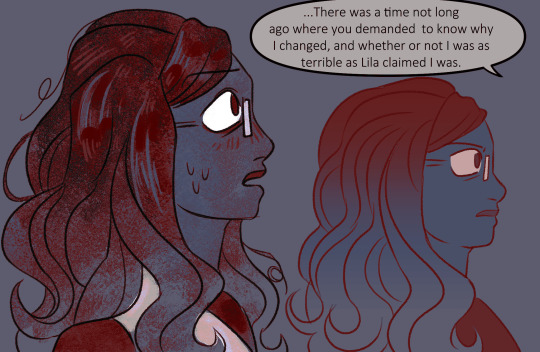
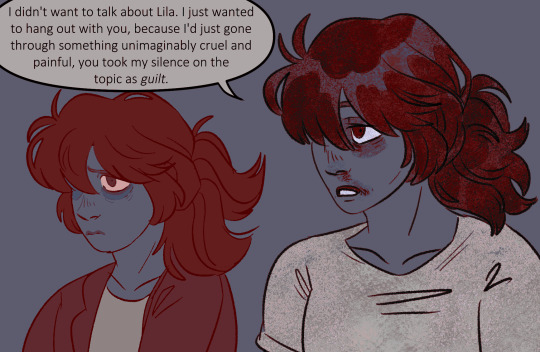


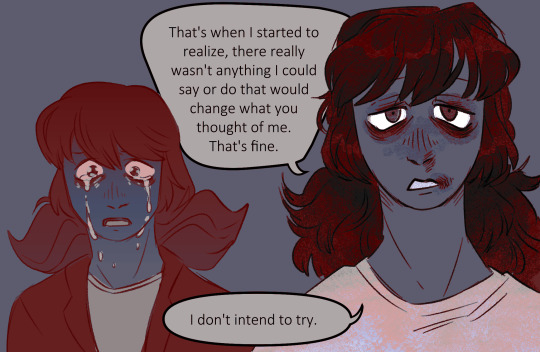
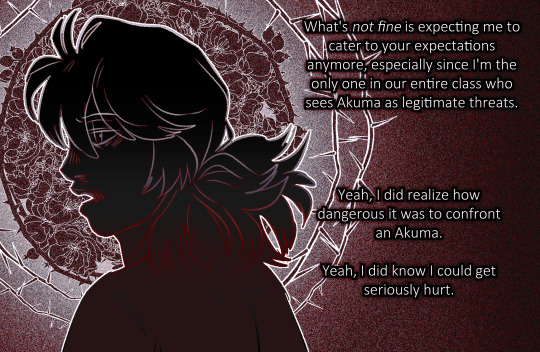


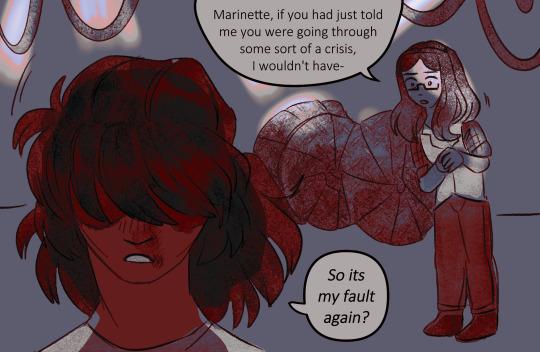
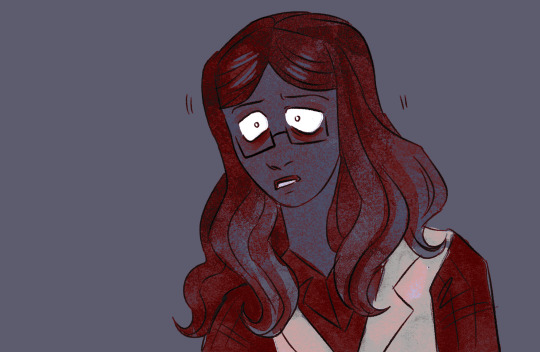




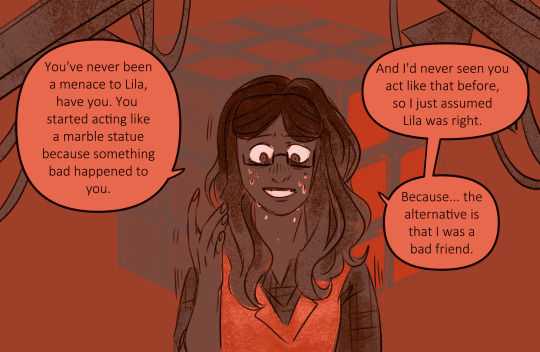
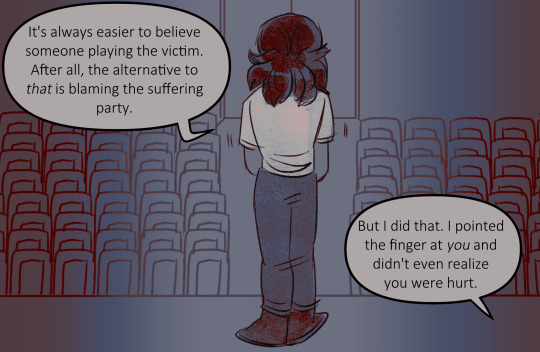
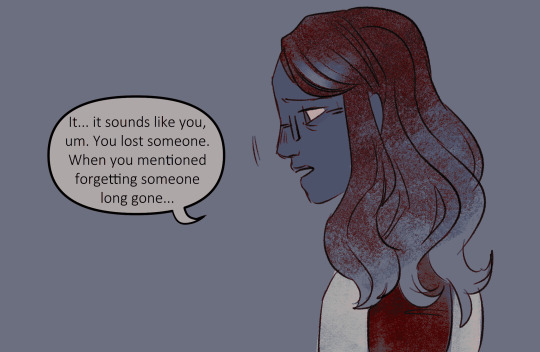
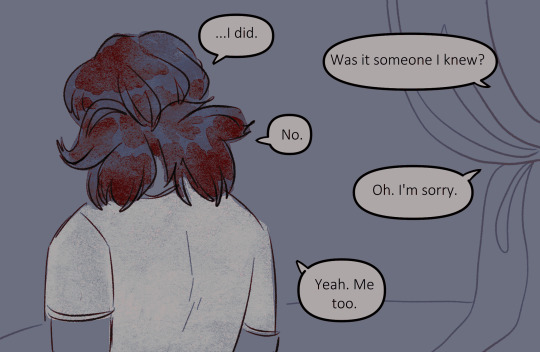
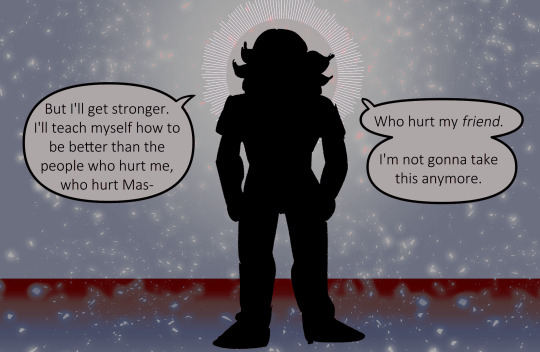
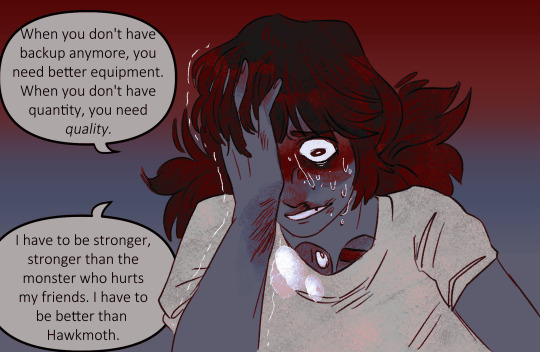

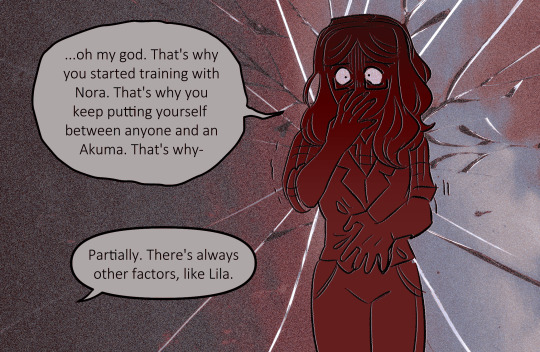


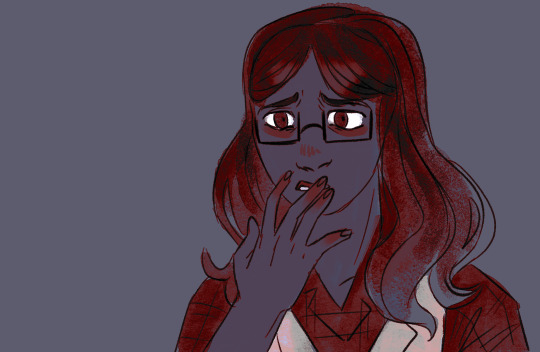
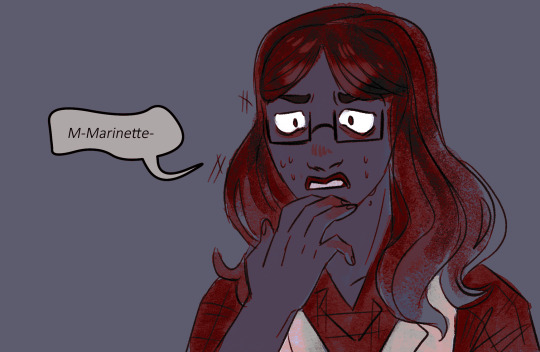

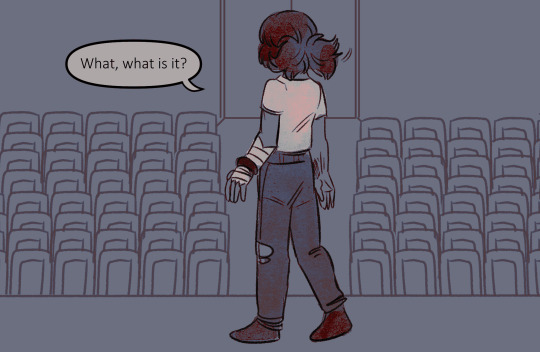
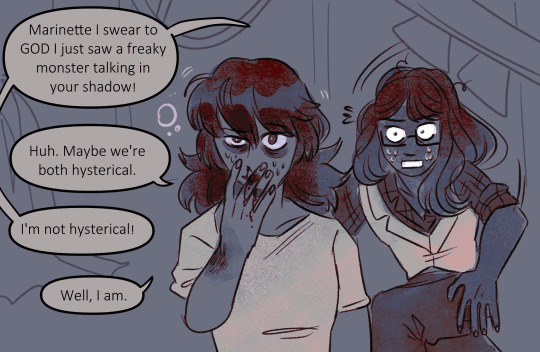
#my art#feralnette au#birds of a feather#long tags#sorry I went apeshit in the tags#LETS SAY IT ALL TOGETHER NOW#I - M - A - G - OOOOOOOOO#its fun drawing marinette's back to Alya and having her appear stout and unstoppable and totally logical#and then you see her face and she's like two seconds from completely snapping and is keeping it together by a thread#as a note just because mari feels very certainly abt smth doesnt mean she's right. feelings can be valid and also irrational#in the throes of grief she decided it was better to be alone than to lose someone again so she started pulling away#and lila made pulling away very very very easy to do#shes also vaguely aware she's being unfair in pinning this on alya which is why she started spinning the drain on cockmoth again#legitimately all the shit that's happened to her wouldn't have been so catastrophic if he was never in the picture and she knows it#but the bitterness of her bestie choosing a fantastic liar over her at the worst of times stiiiiiings#alya's personal timing was bad but lila really took advantage of the fact that marinette had been acting off and weird#she basically clocked marinette as being unstable from SOMETHING and made up a lie about her#knowing she wouldn't have the strength to defend herself#between her social life going tachy bc of lila and losing fu in a way that felt like personhood death marinette was really put on the spot#and alya doing her thing of busting in there and assuming her bias is correct was a terrible combo#essentially marinette is highly unstable and alya is just realizing that#busting in and giving her a lecture when she's slightly hysterical and definitely delirious from exhaustion is NOT the way#to show her she's self sabotaging#cuz thats just gonna make her double down on self sabotaging. bc marinette will not accept that she is also a CHIIIIILD
4K notes
·
View notes
Text

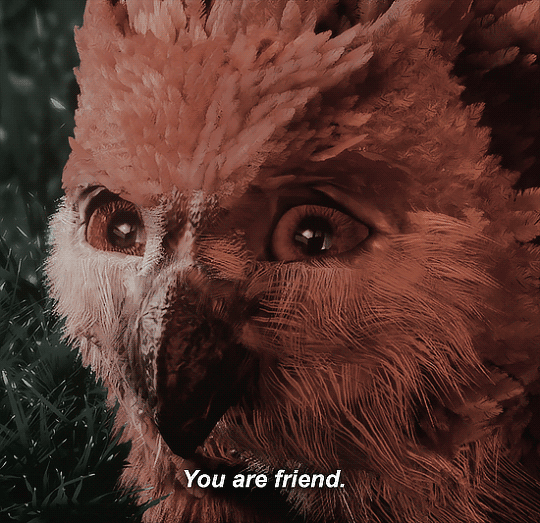
#bg3edit#baldur's gate 3#bg3#*mine#owlbear cub#i know he's been gifed many times better than me BUT i had to!!!!#hes my little friend. my pal. my sweet cheese#not pictured: iona trying not to cry at this bc she's a fucking loser <3
6K notes
·
View notes
Text

date with kaz
#mgs#metal gear solid#kazuhira miller#big boss#bbkaz#sorry this picture has been making me lose my shit today I had to I love redrawing stupid images#my art
3K notes
·
View notes
Text

#bagginshield#this picture has been saved in some bizarre way at first#I couldn't do anything with it because pc asked for the administrator's rights wtf#had to resave it from clip studio file again#that was weird#and now it doesn't want to be uploaded#who cursed my sketch?
3K notes
·
View notes
Text
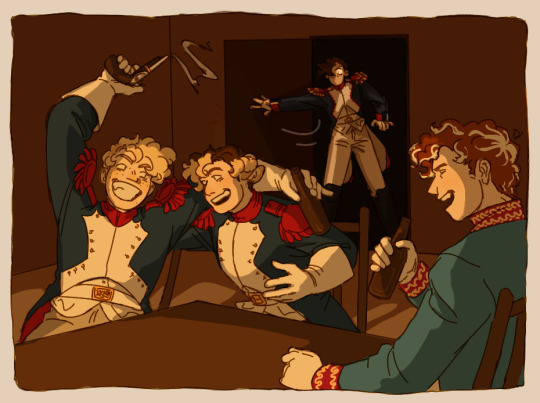


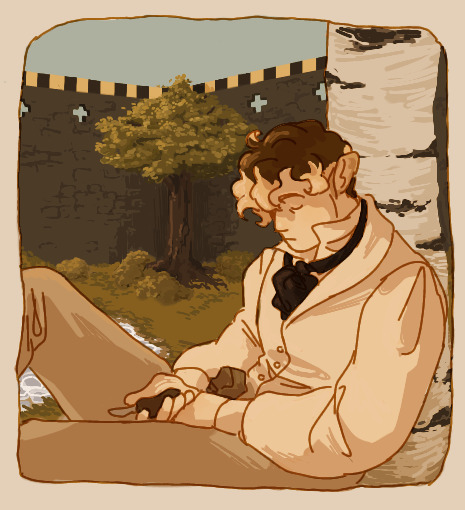
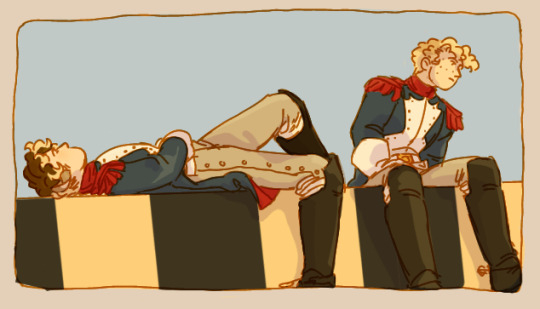
Snapshots of simpler times..
#hellooo been a while.. again#i was overwhelmed by finals but now I've been over two weeks off of school so you get a treat!!#i was feeling nostalgic and wanted to draw uniforms and this came to be#it's supposed to look like candid photos if it doesn't that's the fault of your lacking imagination /s#anyway i tried to improve on different things with each one so they're not really consistent but i tried my best#ignore how inconsistent my artstyle is you just gotta get used to it#the picture with sleepy tubbo is titled whittle boy in my heart <3#the first two are kinda related. tommy shot up the mess hall and had the month's cleaning duty cus of it#anyway i ramble too much here. it's good to be back tho! maybe I'll draw something else before the end of the year lmao#my art#dsmp fanart#cwilbur#ctommy#ctubbo#cniki#cfundy#lmanberg#fennec.art
3K notes
·
View notes
Text


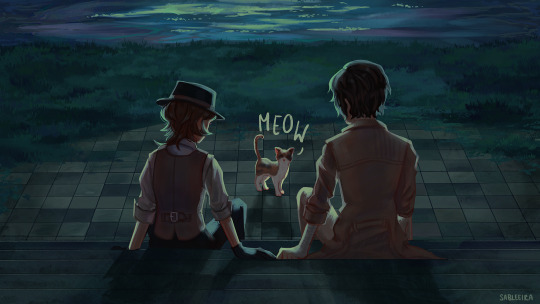
You know how “the moon is beautiful tonight, isn’t it?” is used as an expression for love confessions? It’s said that Natsume Soseki came up with it after overhearing a student translate “I love you” to Japanese in a very literal sense. While there is no source confirming that this exchange actually happened, I still think a scene referencing the expression with Natsume randomly appearing would be hilarious
#I have been sitting on this scenario for MONTHS#I actually found out about it because I watched a cdrama with my gf that has a moon love confession type scene and I didn’t know it was#a thing in other Asian media as well so I had to research the origin.#did you spot the tiny other character cameo in one of these pictures 👀 you have to zoom in really far#soukoku#bungou stray dogs#bsd#bsd fanart#skk#chuuya nakahara#bsd chuuya#osamu dazai#bsd dazai#natsume soseki#bsd natsume#also why do I keep drawing faces in hard angles… Chuuya looked so wonky for a time and it’s still not great but I can live with it#my art
3K notes
·
View notes
Text


#tf2#tf2 spy#team fortress 2#my art#i had to draw him like this as soon as i saw this outfit#help me god i have no self control#after the spy dress picture i havent been the same
2K notes
·
View notes
Text
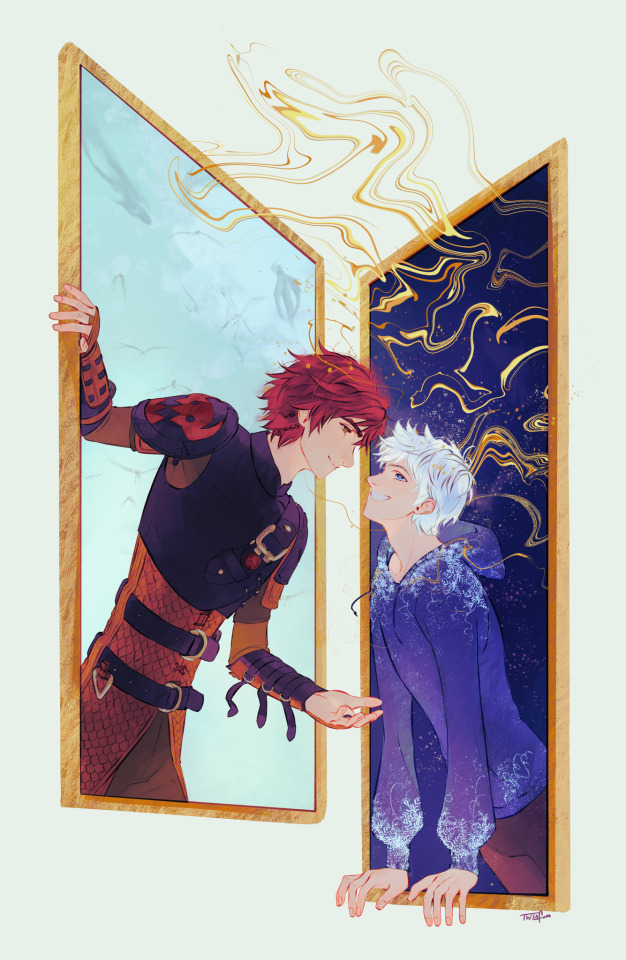
the world next door
hijack anniversary.............2! cannot believe we are 2 years deep into old friends senior hijack sanctuary. love forever to the wonderful friends i have met in this little corner of the weirdonet, you are a beloved part of my heart 🫶
IN PARTICULAR this goes out to @emerialyncodevenice because i swear i have done 12 different versions of this for your bday present AND FINALLY HAVE IT PERFECT. here is universe hopping art gallery au I LOVE YOU BESTIE‼️
#hijack#frostcup#jackycup#rise of the guardians#how to train your dragon#rotg#httyd#art#bestie tag#emerialyncodevenice#i had another idea i was planning on doing too if i couldn't wrangle this one into submission so i'll keep that one on the backburner.......#this piece would not have been possible without the help of my emotional support school photo day n1ki shi1na picture
2K notes
·
View notes
Text
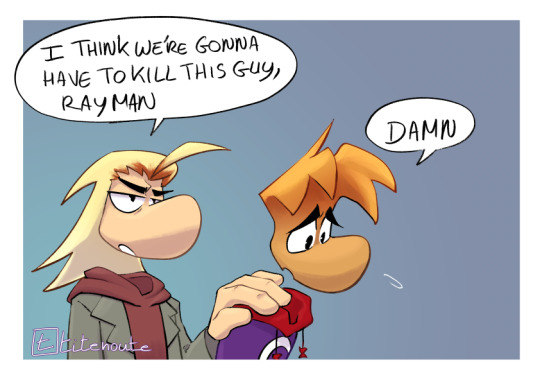
Meme redraw
OG Rayman prefers to choose kindness whenever he can...
V.2 :
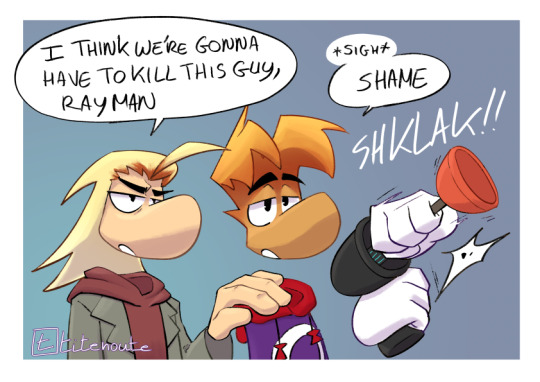
But sometimes, you gotta send a message.
#...that's the second time I draw a relatively pacifist cartoonish character choosing violence in the span of 2 years#and he's purple themed too...kinda#uh#it's not much but it's weird it happened twice#oh well#ramon#rayman#it's been a struggle with those pictures bc guess what#I had to format the computer#and I *thought* I had all my CSP materials backed up in a file#but apparently they changed the placement of the material files without a warning and I didn't back up jack on the cloud#I have a few brushes I had put aside just in case and did well to do so#but all the brush and presets I've created are gone...color palettes included#i am an adult i am not going to cry#back up your material files kids#don't be like me#meme
1K notes
·
View notes
Text

















Vex'ahlia de Rolo || On Goodness, Self, and Longing
“Kith & Kin” - Marieke Nijkamp // “con la frente marchita” - Dante Émile // “Campaign 1, Episode 63: The Echo Tree” - Matthew Mercer // “White Oleander” - Janet Fitch // “Campaign 1, Episode 64: The Frigid Doom” - Liam O’Brien & Taliesin Jaffe // “Pig” - Hieu Minh Nguyen // “Campaign 1, Episode 63: The Echo Tree” - Laura Bailey & Liam O’Brien // “Recollections of my Nonexistence” - Rebecca Solnit // “The Archer” - Taylor Swift // “Campaign 1, Episode 65: The Streets of Ank’Harel” - Laura Bailey & Liam O’Brien // “So We Must Meet Apart” - Jennifer S. Cheng // “Campaign 1, Episode 72: The Elephant in the Room” - Laura Bailey & Liam O’Brien // “Shocker” - Taylor Steele // “Campaign 1, Episode 104: Elysium” - Sam Riegel // “Tell the Wolves I’m Home” - Carol Rifka Brunt // “4-Sided Dive Episode 9: That’s Just Right” - Laura Bailey and Taliesin Jaffe // “Infinite Jest” - David Foster Wallace
#vex'ahlia#vex'ahlia de rolo#percy de rolo#vax'ildan#scanlan shorthalt#saundor#laura bailey#matthew mercer#taliesin jaffe#liam o'brien#sam riegel#critical role#vox machina#cr1#if you saw this earlier no you didn't. pictures formatted weird at first#she's the world to me actually.#this has been in my drafts in pieces for ages but#recently shes been in my head and today i had time and good grief. She#webweave#web weave#web weaving#my posts
2K notes
·
View notes
Text
it mattered because when my brother asked me what if this is the happiest you'll ever be? the best you'll ever get? the thing i felt was fear, not peace. everybody thought you were so perfect for me. even i thought you were "helping me grow". i had to challenge every internal clock. make myself more thoughtful, more kind, more beautiful.
i told my therapist it was good because i like the changes i made and there's something so strong about saying i did that. the problem is that i can like the difference all i want, but i changed for you. something akin to getting your name tattooed, all my progress is stamped with fuck you.
it was the happiest i'd ever been and also the best i'd ever gotten. i would still get in the car and think what the fuck just happened.
#warm up#writeblr#i spent a lot of time picturing our future#how funny to think: in each version of our future#i was never myself#i was someone smarter kinder braver#better adept.#who could navigate the way you shouted and got angry at small things and never fucking believed the best of me#i would never be needy and you'd never get tired of me#people usually talk about how we picture people as being “fixable”. but i assumed i was the problem. my idyllic picture wasn't of you.#it was a version of me that wasn't ill. that needed no extra help. that could be your wife and happy#the fact i wasn't happy was because there is something so wrong inside me. it's always been that way. i convinced myself:#if i stay i can change. if i stay i can make it worth it. i can apologize and fix this. and make us both okay.#for the last year i've been thinking about how you blamed our whole breakup on me. how it was my fault for whatever thing.#and i agreed with you. because of course i did. you'd trained me to believe everything was my fault . that you wanted to love me and i made#it far too hard. that i was always finding ways to ''set you off'.#a few days ago while i was doing something else#i realized that while i was in crisis you told me to fuck off and find someone else to get help. and you never fucking apologized .#you said i made you do that because i wasn't being sensible. i had been crying too hard to speak clearly.#you said: you're doing this to manipulate me.#you forgave yourself for that. i had to forgive you without apology. you said you were right to react that way. and then you were SO#SO annoyed. any time i said: i feel like you aren't nice to me. it is hard to trust that you love me.#i don't think about you that much anymore. but these days when i do: all i can think is that im not sure u ever really understood kindness#you were the cruelest to the people closest to you. and most of the time. that meant it fell to me.
2K notes
·
View notes
Text
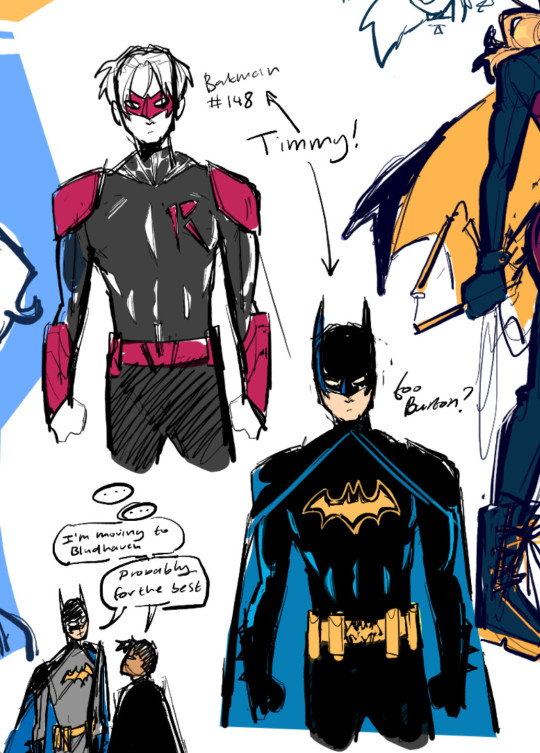
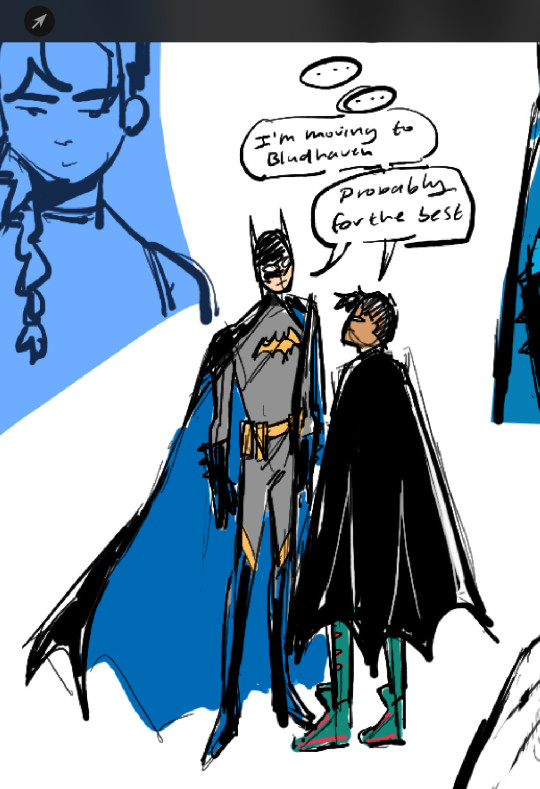
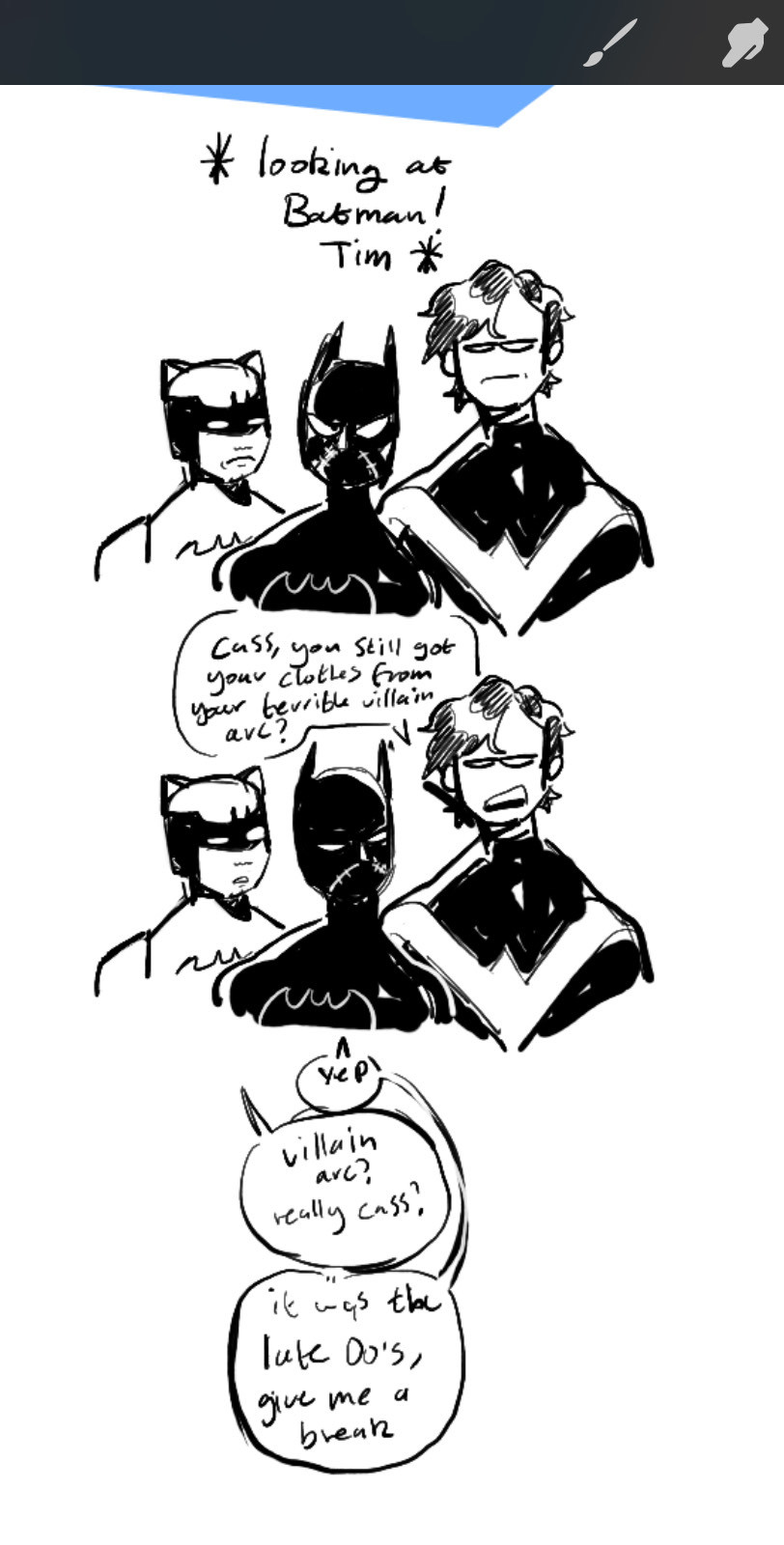
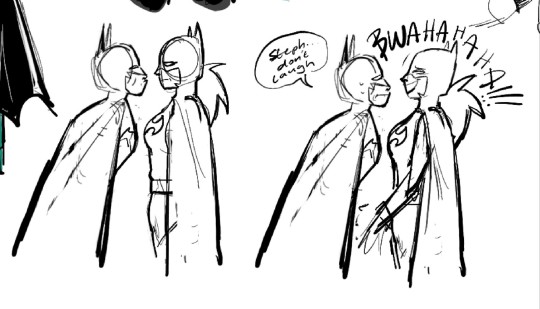
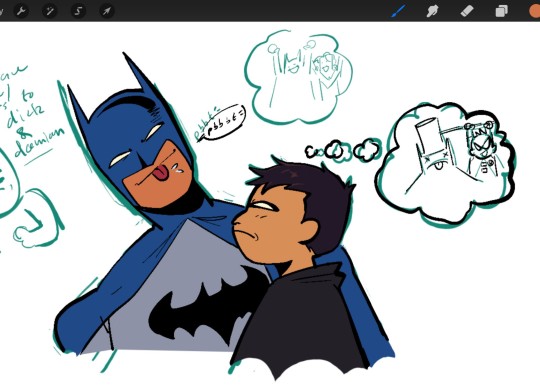
Disgustingly messy and crusty sketch dump but I couldn't get my own terrible theory out of my head and ended up making a bunch of sketches about it. Also at the end a bonus dickbats and Damian doodle bc I was reading an issue of their Batman and Robin run (IDs in Alt)
#dc comics#dc#batfamily#batman#damian wayne#stephanie brown#tim drake#dick grayson#cassandra cain#duke thomas#anyway. zdarsky run sure is something huh?#its still so funny to me that half of 148 was leaked a few days before like someone has it OUT for that book over at bleeding cool ig#i don't necessarily think this theory will come true I'm just imagining how stupid it would be if it did#I'm not super happy with the dialogue in the cass+duke+dick comic but i felt my og dialogue might've read too fanon#mainly just bc cass' last sentence was originally shorter/just ellipses and duke said smthin like ''wait? villain arc?''#which you could easily find in wayne family adventures. even tho it would've been appropriate for this situation 😭#now the dialogue just sounds kind of generic (esp cass') and it's BOTHERING ME AUGHH. this is the comic book fandom panopticon /j#anyway Bruce is in the retirement home in this scenario /j#me n my friends were talking over discord and came up w the cursed scenario that jason is tims robin in this (apart of the 'redemption' arc#-that he's been nail gunned with in this run. god this run is so weird when it comes to jason. like it doesn't outright dislike him-#-like it clearly does damian and (more obviously) cass steph and duke) but the tone of everything w jason is still bizarre#god. anyway yeah i didn't draw him but please picture grown man tank Jason in the robin undies (ala tt 03 but dare i say better)#also the dick being silly sketch was bc the issue i was reading had damian refer to dick as 'jolly'#specifically like ''unreasonably jolly'' or something like that (god i love when ppl find dicks cheerfulness deeply unsettling hehehe)#and i thought it was so funny. bc damian met dick when we has going through his ''bruce is dead'' depression-#-and STILL thought that dick was extremely unserious. he sees happy dick and is like ''what is wrong w you. genuinely''#but at the same time he loves it#i need to stop reading their batman and robin run so scatteredly (or i can just reread nightwing must die...always a possibility)#anyway yeah 👍 bad sketches be upon you#mine
297 notes
·
View notes
Note
hey you might've been asked this before sorry if so, but have you read or do you have any thoughts on A short history of Trans Misogyny?
I have read it! I have a few thoughts.
I think it's a strong and important work that compiles historical archives into sharp analyses of how "trans misogyny" (using Jules Gill-Peterson's spacing) is not a recent phenomenon but a globalized structure with centuries of history. I also think it's flawed, for reasons I'll get into after a quick summary for those who haven't had the chance to read it yet.
JGP divides the book into three main chapters, the first on the notion of "trans panic". There, she traces how variants of this anxiety with the trans-feminized subject have presented—to deadly effect, for the subject—in such different settings as early colonial India, the colonization of the Americas, the racialized interactions between US soldiers stationed in the Philippines and the local trans women living there, and of course the contemporary United States itself. In every case she analyzes this "panic" as the reaction of the capitalist colonial enterprise to the conceptual threat that the trans-feminized subject poses; we are a destabilizing entity, a gender glitch that undermines the rigid guarantees of the patriarchal order maintaining capitalism. Punishment follows.
The second chapter is my favourite, and considers the relationship between transfeminine life and sex work. I posted a concluding excerpt but the thrust of the chapter is this: that the relegation of so many trans women and trans-feminized people to sex work, while accompanied by the derogation and degradation that is associated with sex work, is not itself the mere result of that degradation inflicted upon the subject. In other words, it is not out of pure helplessness and abjection that so many trans-feminized people are involved in sex work. Rather, sex work is a deliberate and calculated choice made by many trans-feminized people in increasingly service-based economies that present limited, often peripheralized, feminized, and/or reproductive, options for paid labour. Paired with a pretty bit of critical confabulation about the histories of Black trans-feminized people travelling the US in the 19th century, I think this made for great reading.
In her third chapter, JGP narrativizes the 20th century relationship between the "gay" and "trans" movements in north america—scare quoted precisely because the two went hand-in-hand for much of their history. She emphasizes this connection, not merely an embedding of one community within another but the tangled mutualism of experiences and subjectivities that co-constituted one another, though not without tension. Then came the liberal capture of the gay rights movement around the 70s, which brought about the famous clashes between the radicalisms of Silvia Rivera and Marsha P Johnson (neither of whom, JGP notes, ever described themselves as trans women) and the institutions of gay liberalism that desired subsumption into the folds of capital. This is a "remember your history" type of chapter, and well-put.
I think JGP is correct to insist, in her introduction, on the globalizing-in-a-destructive-sense effects of the colonial export of trans womanhood. It is, after all, an identity conceived only mid-century to make sense of the medicalized trans subject; and "gender identity" itself (as JGP describes in Histories of the Transgender Child) is a psychomedical concept conceived to rein in the epistemic instability of trans existence. This is critical to keep in mind! But I also think JGP makes a few mistakes, and one of them has to do with this point.
In her first chapter, under the discussion of trans misogyny in colonial India, JGP of course uses the example of the hijra. Unfortunately, she commits two fundamental errors in her use: she mythologizes, however ambiguously, the "ascetic" lives of hijra prior to the arrival of British colonialism; and she says "it's important to say that hijras were not then—and are not today—transgender". In the first place, the reference to the "ascetism" of hijra life prior to the violence of colonialism is evocative of "third-gender" idealizations of primeval gender subjectivities. To put the problem simply: it's well and good to describe the "ritual" roles of gendered subjects people might try to construe contemporarily as "trans women", the priestesses and oracles and divinities of yore. But it is best not to do so too loftily. Being assigned to a particular form of ritualistic reproductive labour because of one's failure to be a man and inability to perform the primary reproductive labour of womanhood-proper is the very marker of the trans-feminized subject. "Ascetism" here obviates the reality that it wasn't all peachy before (I recommend reading Romancing the Transgender Native on this one). Meanwhile, in the after, it is just wrong that hijra are universally not transgender. Many organize specifically under the banners of transfeminism. It's a shame that JGP insists on keeping the trans-feminized life of hijra so firmly demarcated from what she herself acknowledges is globalized transness.
My second big complaint with the book is JGP's slip into a trap I have complained about many times: the equivocation of transfemininity with femininity (do you see why I'm not fond of being described as "transfem"?). She diagnoses the root of transmisogyny as a reaction to the femininity of trans women and other trans-feminized subjects. In this respect she explicitly subscribes to a form of mujerísima, and of the trans-feminized subject as "the most feminine" and (equivalent, as far as she's concerned) "the most woman". Moreover, she locates transfeminist liberation in a singular embrace of mujerísima as descriptive of trans-feminized subjectivity. As I've discussed previously, I think this is a misdiagnosis. Feminization is, of course, something that is done to people; it is certainly the case that the trans-feminized subject is in this way feminized for perceived gender-failure. This subject may simultaneously embrace feminized ways of being for all sorts of reasons. In both cases I think the feminization follows from, rather than precedes, the trans misogyny and trans-feminization, and there is a fair bit of masculinization as de-gendering at play too, to say nothing of the deliberate embrace of masculinity by "trans-feminized" subjects. Masculinity and femininity are already technologies of gender normalization—they are applied against gender deviation and adapted to by the gender deviant. The deviation happens first, in the failure to adhere to the expectations of gender assignment, and I don't think these expectations can be summarized by either masculinity or femininity alone. I think JGP is effectively describing the experience of many trans-feminized people, but I do not think what she presents can be the universalized locus of trans liberation she seems to want it to be.
Now for a pettier complaint that I've made before, but one that I think surfaces JGP's academic context. In her introduction she says:
In truth, everyone is implicated in and shaped by trans misogyny. There is no one who is purely affected by it to the point of living in a state of total victimization, just as there is no one who lives entirely exempt from its machinations. There is no perfect language to be discovered, or invented, to solve the problem of trans misogyny by labeling its proper perpetrator and victim.
Agreed that "there is no perfect language to be discovered"! But JGP is clearly critical of TMA/TME language here. Strange, then, that less than ten pages later she says this:
this book adds the phrase trans-feminized to describe what happens to groups subjected to trans misogyny though they did not, or still do not, wish to be known as transgender women.
So JGP believes it is coherent to talk about "groups subjected to trans misogyny", which she thinks consists of the union of trans women and what she called "trans-feminized" groups. If this is to be coherent, there must be groups not subjected to trans misogny. So we've come around to transmisogyny-subjected and not transmisogyny-subjected. Look: you cannot effectively theorize about transmisogyny without recognizing that its logic paints a particular target, and you will need to come up with a concise way of making this distinction. But JGP dismissing TMA/TME with skepticism about "perfect language" and immediately coining new language (basically TMS/not TMS) to solve the problem she un-solved by rejecting TMA/TME... it smells of a sloppy attempt to make a rhetorical point rather than theoretical rigour. It's frustrating.
I have other minor gripes, like her artificial separation of "trans women" from "nonbinary people" (cf. countless posts on here lamenting the narrow forms of existence granted TMA people if we want recognition as-such!) or her suggestion that "a politics of overcoming the gender binary" is mutually exclusive from rather than necessarily involved with struggles around "prison abolition, police violence, and sex work". Little things that give me the sense of theoretical tunnel-vision. But I don't think all this compromises the book's strengths as a work of broad historical analysis. I would simply not take every one of its claims as authoritative. Definitely give it a read if you have the chance, especially for the second and third chapters.
#ask answer#jules gill-peterson#(i haven't been asked this before ty for asking <3 🐐)#note that this was mostly off the cuff except what i had taken pictures of bc i left the book in toronto for my mom to read
320 notes
·
View notes